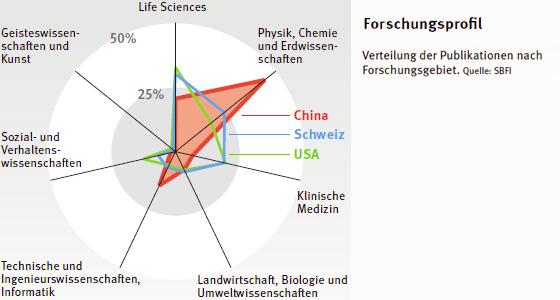Beijing’s research gambit

China aims to reverse its brain drain by offering researchers ample salaries, lab animals and infrastructure. But clean air and Internet freedom are not included. By David Cyranoski
(From "Horizons" no. 108 March 2016)
Over the past two decades, China has lived through the most impressive science boom in modern history. What was once a scientific backwater is now the world's second ranking nation by the number of scientific papers published. It is even poised to snatch the top spot from the United States. Furthermore, all those papers, especially in such fields as physics, chemistry and genomics, are increasingly appearing in top-tier journals.
It is not just publications. China has also sent a probe to the Moon and more recently launched a satellite that may give it the edge in the global quest to identify dark matter. China, it seems, is ready to compete at the forefront in most fields of science and technology.
The boom has been driven by the determined efforts to reclaim the Chinese brains cultivated abroad. The 1000 Talents programme, launched in 2008, has been the most successful of these efforts. It has a number of components, including a salary and housing allowance that can easily surpass 100,000 US dollars and generous research funding, says Cong Cao, a science-policy researcher at the University of Nottingham's Ningbo campus, himself a recent returnee. "It's just the opportunities", he says.
Yigong Shi (see portrait), vice-president of Tsinghua University, says the salaries of top researchers in China, while still below the equivalent levels in the United States, are growing rapidly and the equipment there is usually better too. The human resources are also a draw, because it is easy to attract large numbers of hard-working students. Although many top students pursue graduate studies in the United States, some choose to stay in China. "They are more motivated and spend more time in the lab. As a consequence, their research is even stronger", says Shi.
Internet lock-down
But China has faced an uphill battle in recruiting the best. Positions in the United States and Europe are still considered more prestigious. In the early years of the 1000 Talents programme, many scientists maintained their affiliations outside of China and spent most of their time abroad, treating their positions at home almost as part-time jobs that were merely a source of extra income or of graduate students. As a countermeasure, China launched the 'Young Professionals' plan within the 1000 Talents programme, ensuring that PhD students would have to come back to work full-time.
But this push to retrieve foreign-trained scholars has created tension, especially in cases where young, inexperienced scientists earn salaries ten times greater than the heads of neighbouring laboratories whose comparable experience was 'home-grown'.
There are other obstacles to regaining brains. Shi says some scientists turn down offers because of the air quality – especially in Beijing where pollutants sometimes reach hazardous levels. Some potential returnees baulk at China's administrative heavy handedness and obsession with quantitative metrics.
Many scientists also hesitate to work in China because of the restrictions on the use of the internet. Most notably, the government blocks access to Google Scholar, which is used by academics across the planet to find and stay on top of cutting- edge research. "The impact on second and third tier universities is especially hard, because they may not have well-stocked libraries", says Cao.
Liberties without ethical concerns
But China does also have some freedoms. The absence of an animal rights movement is one example. Chinese scientists have in fact had a field day applying new gene- editing techniques to animals. In 2015, they produced lap-sized mini-pigs, 'super-muscled' pigs and dogs, and are working on an assortment of primates engineered to be models of certain diseases such as autism. Some researchers famously used the new techniques to modify the genome of a human embryo. And recently, a local government unveiled plans for the world's biggest cloning factory, which will breed cattle, dogs and race horses.
These efforts might have met with resistance in the West, but in China, scientists can move forward quickly. Economics also drives this, says Xingxu Huang, who returned from a six-year postdoctoral stint at Baylor College of Medicine in Houston and now leads a group at Shanghai Tech University. His plans, i.e., genome engineering in large animals such as pigs, goats and monkeys, are "more feasible in China than in the United States because the animals are cheaper and more accessible".
The government even provides incentives to entrepreneurship. "All this exemplifies what scientists can do in China", says Shi. "Whether it's starting a business or doing research with stem cells or primates, researchers are given a greater degree of latitude".
Still, there is a way to go. When asked what is holding back science in China, Cao says, "the shortage of talent is the biggest issue".
David Cyranoski is the Asia-Pacific correspondent for Nature.